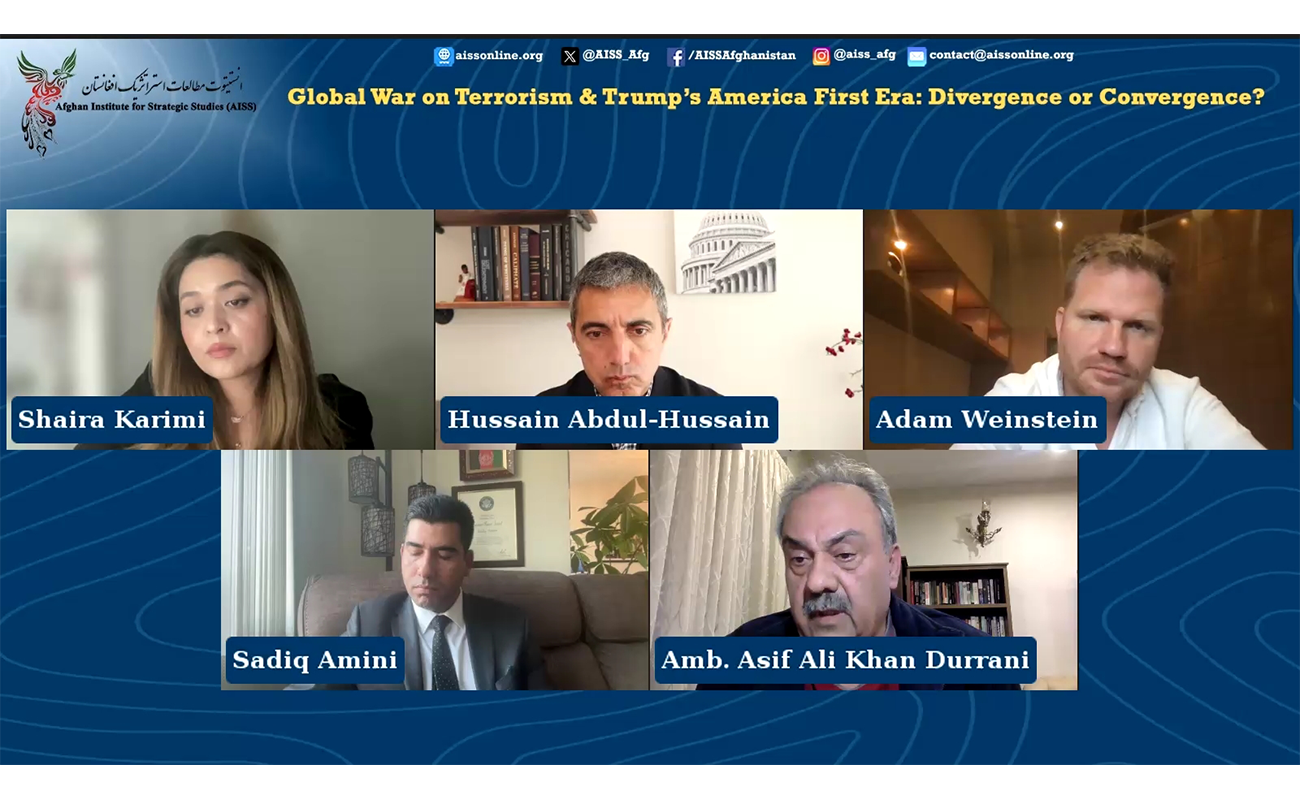Webinar: Global War on Terrorism & Trump’s America First Era: Divergence or Convergence?
The course of U.S. foreign policy has shifted profoundly since the September 11 attacks, particularly in its response to terrorism. At first, the Global War on Terror (GWOT) dominated U.S. strategy. However, as global realities changed—especially after 2011—counterterrorism was pushed to the background in favor of broader geopolitical interests. This report summarizes AISS’s recent webinar where experts discussed the consequences of these shifts. They examined the relationship between the GWOT and the "America First" doctrine, assessed U.S. counterterrorism efforts, and explored the regional outcomes of these policy adjustments.
On November 26, 2024. the Afghan Institute for Strategic Studies hosted a webinar titled “Global War on Terrorism & Trump's America First Era: Divergence or Convergence?” The webinar featured four notable speakers: Ambassador Asif Ali Durrani, a Veteran Diplomat and Regional Expert; Hussain Abdul-Hussain, a Research Fellow at the Foundation for Defense of Democracies; Adam Weinstein is the Deputy Director of the Middle East Program at the Quincy Institute; and Sadiq Amini, Public Diplomacy and International Security Expert. Each offered a distinct view of U.S. counterterrorism strategies, regional issues, and the broader challenges influencing U.S. foreign policy.
The discussion centered on the gradual move in U.S. foreign policy from counterterrorism to broader international goals. The GWOT, which shaped American actions in the early 2000s, began losing prominence with the Obama administration’s 2011 "Pivot to Asia." Under President Trump, this shift accelerated, with the U.S. reducing its global military footprint and concentrating on domestic concerns. The 2020 Doha Agreement paved the way for the U.S. withdrawal from Afghanistan and marked a major change in counterterrorism priorities.
Ambassador Durrani stated that the withdrawal effectively marked the end of the GWOT, even if counterterrorism remains a feature of U.S. rhetoric. He argued that regional stability, once a key focus of U.S. policy, is now largely left to neighboring countries as the U.S. opts for limited involvement in Afghanistan’s future.
The panelists debated the extent to which the U.S. can counter extremism through foreign policy and military actions. Adam Weinstein argued that while the U.S. can manage threats, its ability to root out extremism is limited. He noted that extremism often stems from domestic issues, and foreign interventions—such as those in Afghanistan—frequently worsen these problems. Weinstein pointed to the Obama-era surge in Afghanistan as a poorly executed strategy that failed to address the underlying drivers of extremism.
Hussain Abdul-Hussain shared similar concerns, pointing out that large-scale interventions have repeatedly fallen short. He argued that extremist ideologies often thrive in fragile states and are used by regional powers to further their own goals. The importance of building stronger states rather than focusing solely on counterterrorism operations that are disconnected from local realities.
The discussion also addressed the influence of regional powers on U.S. counterterrorism efforts. Both Durrani and Amini agreed on the need for a broader approach to stabilizing the region. Durrani noted that U.S. engagement with the Taliban, while controversial, could be seen as a necessary step to maintain regional stability. He urged the international community to help Afghanistan address its internal divisions, which could otherwise result in the country becoming a haven for terrorism once again.
Amini, on the other hand, was more critical of engaging with the Taliban, arguing that it only legitimized an oppressive regime. He pointed to the Taliban's alliances with adversarial powers, such as Iran and Pakistan, and warned that continued U.S. support for the Taliban would undermine the credibility of U.S. counterterrorism efforts. Hussain Abdul-Hussain added that the U.S. withdrawal has left a gap, allowing countries such as China and Iran to expand their influence in Afghanistan. He warned that this shift could harm U.S. interests and create new security challenges across the broader region.
The panelists had differing views on the way forward for U.S. counterterrorism policy. Adam Weinstein called for a limited approach to engaging with the Taliban, suggesting that the U.S. could monitor the situation and maintain some leverage for future scenarios. He argued against the "all-or-nothing" mindset that has shaped past U.S. policies, urging more flexibility.
Amini called for a complete break with the Taliban, urging the U.S. to support Afghan resistance movements instead. He stressed the importance of empowering local forces to represent people’s aspirations. Meanwhile, Hussain Abdul-Hussain suggested that the U.S. should rely more on intelligence and targeted operations to handle threats rather than committing large numbers of troops. He stressed the importance of finding a practical balance between deterrence and diplomacy.
Keynotes:
- Changing Priorities: Since 2011, U.S. attention has shifted from counterterrorism to addressing larger global concerns, such as its rivalry with China and the Indo-Pacific region.
- Limits of Interventions: Military action alone has failed to address the deeper causes of extremism. The focus needs to be on strengthening local governments and communities.
- Regional Challenges: The involvement of countries like Pakistan, Iran, and China has added complexity to U.S. efforts in Afghanistan. Effective management of these dynamics is necessary to address broader regional challenges.
- Measured Strategies: Future policies must strike a middle ground, avoiding both full disengagement and heavy-handed interventions. Limited cooperation with key players may help preserve stability.
- Proactive Action: Amini’s perspective highlighted the importance of working with Afghan resistance groups early rather than waiting for deeper instability to set in.
The adjustments in U.S. counterterrorism policy over the years reflect changes in global priorities. Yet, the task of addressing extremism and ensuring security remains a complex challenge. Future strategies must carefully combine military, intelligence, and diplomatic tools to tackle both immediate threats and the long-term issues that fuel instability, ensuring a more balanced and effective approach to global security.

